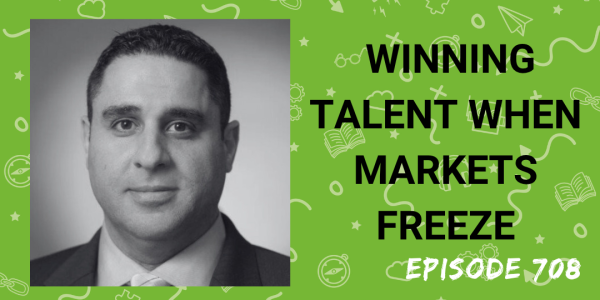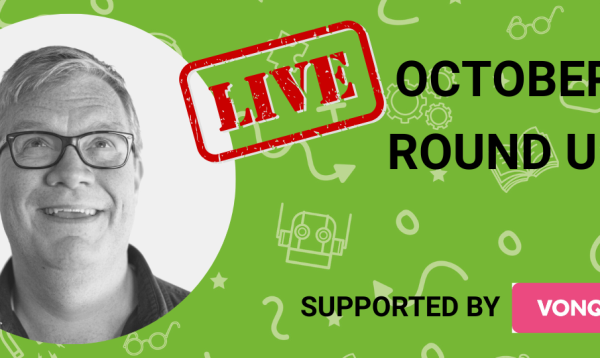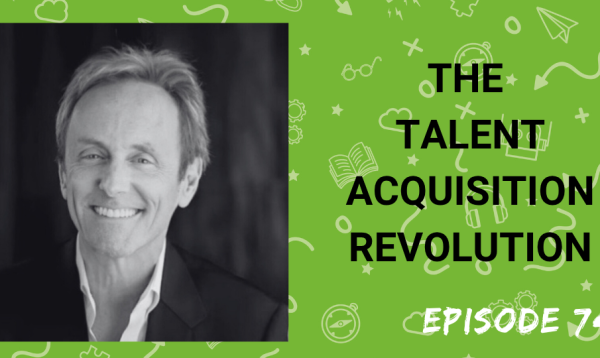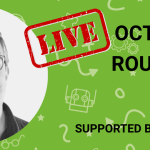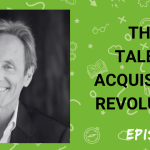Recruiting Future is a podcast that helps Talent Acquisition teams drive measurable impact by developing their strategic capability in Foresight, Influence, Talent, and Technology.
This episode is about talent.
Economic uncertainty and disruption has reached a whole new level in 2025, with companies freezing hiring plans and candidates hesitating to make career moves. But if talent attraction strategies fail during market volatility, how can organizations that need scarce and specialized talent survive and thrive?
So, when candidate markets are tight, how can TA teams turn uncertainty into opportunity?
My guest this week is Dave Napeloni, Senior Vice President of Global Life Sciences at Korn Ferry. Dave’s team is helping life sciences companies navigate talent scarcity by transforming how they engage with candidates during economic disruption. Dave has valuable insights to share, on effective talent engagement and pipeline building, that are changing how organizations compete for talent in these uncertain times.
In the interview, we discuss
• The talent market challenges in Life Sciences
• Dealing with long-term uncertainty
• The impact on candidate behavior
• How successful companies are using volatility as a competitive advantage
• The critical importance of EVPs and employer branding
• Building candidate engagement through purpose-driven messaging
• Extending the role of TA beyond onboarding and into talent management
• How AI can radically improve the candidate experience
• What the future might look like
Follow this podcast on Apple Podcasts.
Follow this podcast on Spotify.
00:00
Matt Alder
Does economic disruption mean that companies have to completely rethink their talent strategies? What if the answer to securing scarce talent isn’t waiting for stability, but embracing uncertainty as a competitive advantage? To discover how leading organizations are attracting the best talent in volatile times, just keep listening.
00:23
Matt Alder
Support for this podcast comes from Vonq. Vonq is transforming recruitment advertising with a results driven platform that helps employers attract, vet and shortlist top quality candidates efficiently trusted by global leaders like Danone, Bayer, Randstadt and PwC. Vonq combines AI powered technology, deep ATS integrations and recruitment expertise to streamline hiring workflows, enhance employer branding and deliver measurable outcomes. With Vonq, you can streamline your recruitment process, improve ROI and build diverse high performing teams. Hire smarter, faster.
01:24
Matt Alder
Hi there. Welcome to episode 708 of Recruiting Future with me, Matt Alder. Recruiting Future is a podcast that helps talent acquisition teams drive measurable impact by developing their strategic capability in foresight, influence, talent and technology. This episode is all about talent. Economic uncertainty and disruption has reached a whole new level in 2025 with companies freezing hiring plans and candidates hesitating to make career moves. But if talent attraction strategies fail during market volatility, how can organizations that need scarce and specialized talent survive and thrive? So when candidate markets are tight, how can TA teams turn uncertainty into opportunity? My guest this week is Dave Napeloni, Senior VP of Global Life Sciences at Korn Ferry. Dave’s team is helping life science companies navigate talent scarcity by transforming how they engage with candidates during economic disruption.
02:34
Matt Alder
Dave has valuable insights to share on effective talent engagement and pipeline building that are changing how organizations compete for talent in these uncertain times.
02:46
Matt Alder
Hi Dave and welcome to the podcast.
02:49
Dave Napeloni
Great to be here, Matt. Thank you for having me.
02:50
Matt Alder
An absolute pleasure to have you on the show. Please could you introduce yourself and tell us what you do?
02:56
Dave Napeloni
Yeah. Dave Napeloni I am with Korn Ferry. I’m a Senior Vice President of Global Life Sciences, which essentially means I oversee our global footprint for our RPO World in Life Sciences. I’ve been here for 11 years and I’m very happy to be here.
03:15
Matt Alder
Fantastic.
03:15
Matt Alder
And so tell us a little bit about that sort of market that you work in. What are your clients biggest talent challenges at the moment?
03:23
Dave Napeloni
Yeah, it’s an interesting question because I gotta tell you, if you had asked me this question a week ago, I think I probably would have given you a different answer than I might give you today and certainly probably different than I’d give you next week, considering the climate, the political climate that we’re seeing these days. I think one of the biggest challenges certainly today is the unknown, which is a little bit more dramatic these days than it had been. The tariff issues, of course, the political and economic issues are really stressing a lot of the planning that our clients are typically going through at this point, whether it be manufacturing or build outs or just investment in hiring across the globe.
04:04
Dave Napeloni
So I think that’s certainly one of the biggest challenges is that of course there’s always challenges related to know skills and people availability and those types of things. But right now, absolutely, our clients are really focused on the uncertainty within the markets and how that might play to where their investments might be.
04:21
Matt Alder
I know it’s impossible to say, but it’s just like, how does that kind of play out if uncertainty sort of continues for the long term or indefinitely? How do you think the market kind of eventually responds when it’s sort of over the shock A bit all.
04:34
Dave Napeloni
Yeah, you know, and it may be that we’re a little bit past the shock point and considering the sort of volatility with it creates a, believe it or not, a certain level of stability. And what I mean by that is I think the shock of oh no, where do we invest now? Has dissipated. And the idea is, okay, well we can’t answer that question, so let’s be prudent on how we invest and where we invest and continue with most of our strategies with an eye US Government or on some tariffs or whatever it may be and be prepared to react. So most of our clients essentially have a plan A and a plan B and probably C and D as well. And plan A is a scaled back version of what maybe their original strategies may have been.
05:19
Dave Napeloni
So it’s, you know, it’s a lot of planning, it’s a lot of discussions, it’s a lot of hypercare meetings internally within our clients right now to be prepared for any change and be able to pivot on that change.
05:31
Matt Alder
And kind of against this backdrop, what sort of patterns are you seeing in candidate behavior? Are people more willing or less willing to sort of move right now?
05:42
Dave Napeloni
Yeah, it’s interesting because we are moving, especially in Life Sciences as we’re all speaking in particular, we’ve seen over the last few years this thinning of available talent to begin with. And because Life Sciences tends to have a much more niche set of skill sets required for most roles, the candidate availability has always been or is Certainly much more difficult now than it had been. I think I would compound that with the idea that candidates are not necessarily hesitant, but it certainly does take a little bit more thought on their side to determine whether or not they’re going to make a switch.
06:18
Dave Napeloni
And I’m certainly referring to passive candidates, not those that may have been on the market already, but the passive talent market, which is a pretty high proportion of source candidates within Life Sciences, is really taking a moment to say, okay, if I do switch to this company, how will some of those tariff or economic issues, how will that impact that client or that company? And I don’t know that any of us know. So it is a little bit of a flip of a coin. But there is a pause the candidates are having at the moment. So, you know, right now it really is the critical time for our clients to highlight the, you know, the branding, the evp, to highlight the investment in training and development to really showcase why a candidate might be wanting to make a switch.
07:05
Matt Alder
Yeah, absolutely. And, you know, let’s kind of dive.
07:08
Matt Alder
Into that because during any kind of time like this, there’s always this temptation that employers kind of step back and do nothing. But if we’re talking about talent pools that are. That are ultra competitive, I mean, that’s not going to. The fundamentals of how they kind of research and manufacture things aren’t going to change. So that’s talent that they’re definitely going to need at some point kind of moving forward. How do you think they should sort of be focusing their efforts to kind of really stand out during this kind of period of time?
07:36
Dave Napeloni
Yeah, I mean, we consult with our clients pretty frequently on the need for candidate engagement. That really emphasizes the culture and the purpose within our clients. We find that’s really a critical part to why candidates might be making a switch within Life Sciences in particular. And so, you know, as we’re working with them, we’re typically consulting on those particular areas to really drive candidate engagement and candidate volumes for niche roles. But the other part of it is, you know, from a recruitment perspective, just a genuine recruitment perspective, what we’re doing is arming recruiters with more of that branding and more of those talking points that highlight those particular areas.
08:21
Dave Napeloni
So that as they’re engaging the market and creating candidate pools, as they’re going after these niche backgrounds and these candidates that they’re armed with, you know, what is really critical for candidates to hear, it’s not always about, you know, dollars and cents, and it certainly isn’t just about returning to the office. That we would have spoken to maybe six months ago. You know, now it’s about purpose. It’s about pipelining the, you know, the product pipeline and the culture and climate of the environment as well.
08:52
Matt Alder
I mean, that’s kind of really interesting. So are they the sort of the big things that candidates are looking for right now? How do you kind of sort of break that down in terms of the things that are really going to get their attention?
09:03
Dave Napeloni
Yeah, I think we always try to identify something that isn’t compensation. But of course, compensation sits at the top of the list for the vast majority of physicians and generations that are out there. I think the gap is narrow, though. Stability. And again, when we think about life sciences in particular, not just current products that might be on the market, but again, that pipeline of products that are currently in development for. For a company really comes to the. To the forefront. I think you match that with the particular therapeutic areas that a company is working within and how that might intersect with a person’s purpose in their role really is on top of the list as well. So the things that are sort of waning at the moment might be again, returning to the office and that sort of thing.
09:52
Dave Napeloni
But I always put comp at the top of the list. And again, purpose and stability and pipeline and therapeutic classes, those are the critical areas that our candidates are really focused nowadays. You can pepper in development and growth and, you know, Runway within the. Within the particular company as well. But that’s kind of how I would set it these days. It’s really interesting because it’s. I don’t know that it’s necessarily shifted just the. I think the emphasis or the percentages have just changed a little bit over time.
10:23
Matt Alder
Yeah, absolutely. As they kind of tend to do, particularly in times of dramatic instability. Talking about sort of dramatic instability, obviously, you know, talent acquisition recruiting is kind of going through its own sort of sense of disruption at the moment. And I suppose that you work with.
10:42
Matt Alder
Clients who’ve got a kind of really.
10:44
Matt Alder
Sort of keen sense of the talent that they have and the skills that they have in the business and how they need to kind of nurture those and grow those and. And all of those kind of things. How do you think the role of talent acquisition is evolving at the moment? Is there a role sort of beyond offer acceptance and some kind of merging between talent acquisition and talent management?
11:05
Dave Napeloni
Yeah, I think the idea of where talent acquisition stops and talent management or where that starts is certainly great and blended at this point. And it’s a really good thing because a candidate doesn’t necessarily see their integration within the organization as when they get the offer letter or they sign the offer letter, you know, they see it really within the first few months of actually being on payroll. And what we’re starting to see within our clients, which is a great thing, is talent acquisitions impact. Moving beyond talent or beyond offer acceptance and really working its way through those first few months of the pre boarding and onboarding stage as well. And what it’s doing is it’s creating a significantly better experience for the candidate, again pre offer and then, you know, post start as well.
11:52
Dave Napeloni
And I think most studies that I’ve seen, if not all, have highlighted the idea that a really strong onboarding experience reflects in the attrition rate and the satisfaction of the employee as they’re entering into the company. So by being able to keep a more consistent partner and experience throughout that process for the candidate, it’s really, it’s great for the organization too as it relates to what their overall cost might be for attrition. But again, you know, the candidates experience, the employees experience is that much greater by keeping some of that consistency. And so, you know, talent acquisition, you know, moving into the first few months of employment, whether it be about benefit discussions, culture discussions, purpose discussions, and having a softer handoff to talent management and to hr, is really a best practice.
12:41
Dave Napeloni
And it’s what we’re starting to see more and more with some of our clients that are on the forefront of this. And again, as a, you know, talent acquisition advocate, you know, I really see it as positive for how we are genuinely partnered with candidates as well.
12:53
Matt Alder
The other disruptors force or you know, perhaps the main disruptive force in TA at the moment is technology. Where do you think AI is taking us when it comes to recruiting? What’s the right balance between humans and AI, you know, other machines taking over? What’s, what’s your perspective on it?
13:10
Dave Napeloni
Yeah, I mean, you know, listen, I’ve been in this for a bit and I think we probably had the same discussion and you could have just replaced AI with other terms over the course of these many years at this point and back to the day of the Rolodex switching to a computer database and whatnot. I think the fear of change is greater than the impact to change. And I guess what I mean by that is I don’t know that the role of the recruiter is necessarily changing, but the tools that they’re using to make the candidate experience and hiring manager experience that much better is changing and being enhanced. And I think the role of AI is allowing for recruiters to be much more consultative in the process as it relates to the vetting process and to the acquisition process of a candidate.
14:02
Dave Napeloni
Yeah, certainly it’s becoming a better tool and a stronger tool to allow candidates to really be a part of the process as opposed to being an outlier to the process. And so, you know, as they’re speaking to hiring managers, you know, using this technology to identify insights like candid availability matched skills, locations where we might find folks and comp and that sort of thing is really enhanced their ability to be more of a partner to hiring managers and to HR as opposed to just a more tactical role. And that’s the expectation on how we want our clients to feel that partnership by a recruiter. So utilizing the phrase like a talent acquisition business partner is not by accident. The expectation is that our recruiters are working in that way and AI is helping them now.
14:52
Dave Napeloni
It certainly is allowing us to cast a wider net. It is absolutely helping as it relates to inclusionary sourcing. It is, you know, great as it relates to empowering recruiters with more information to be more credible and more confident in the recruitment process. And that’s great. I don’t know that our world is ready for a recruiterless environment and to be exclusive to AI, but it’s a great tool and we’re going to continue to see it and we’re hoping that, you know, more and more of our clients continue to embrace it.
15:22
Matt Alder
And following on for that, as a final question, what do you think the future looks like? Where might we be in two or three years time when it comes to recruiting?
15:32
Dave Napeloni
You know, I think we’re going to be passed or over the hump on some of the compliance and legal complexities that come with integrating artificial intelligence or gen AI into the recruitment process. I think some of the privacy issues and bias issues will be a solve at that point. And I think we’ll see again, you know, talent acquisition be much more strategic, much more proactive in our stance and our approach. And that’s a great thing. You know, where we sit right now with Mort Ferry and being able to drive our clients forward is to embrace that evolution. And so, you know, two years from now, three years from now, we really want TA business partners. We want recruiters working as insightfully as they possibly can with hiring managers.
16:11
Dave Napeloni
And you know, I think from a candidate experience, I think it’s going to be more commonplace interacting with a chat bottle or you know, working through systems that essentially are identifying skills within a resume or skills within a person’s background rather than just, you know, where they may have worked and for how long they may have worked there. And that skills based hiring is certainly something we’re working with our clients on right now. But I think that’s going to be really much more commonplace in the next couple years when you consider the lowering of the candidate pool and the working population.
16:43
Matt Alder
Dave, thank you very much for talking to me.
16:45
Dave Napeloni
Yeah, I appreciate the time, man. Thanks.
16:48
Matt Alder
My thanks to Dave. You can follow this podcast on Apple Podcasts on Spotify or wherever you get your podcasts. You can search all the past episodes@recruitingfuture.com on that site. You can also subscribe to our weekly newsletter, Recruiting Future Feast and get the inside track on everything that’s coming up on the show. Thanks very much for listening. I’ll be back next time and I hope you’ll join me.

